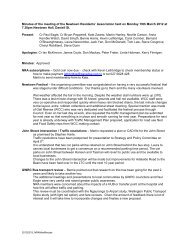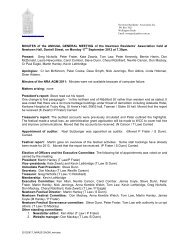Draft Town Belt Management Plan - Wellington City Council
Draft Town Belt Management Plan - Wellington City Council
Draft Town Belt Management Plan - Wellington City Council
Create successful ePaper yourself
Turn your PDF publications into a flip-book with our unique Google optimized e-Paper software.
the benefits of regular exercise on general health and wellbeing have been recognised. A 2009<br />
survey of 1000 <strong>Wellington</strong>ians found that nearly half use the <strong>Town</strong> <strong>Belt</strong> monthly for this type of<br />
informal recreation activity; 28 percent use it at least monthly for organised sport. Other research<br />
has identified the benefits to mental health of interaction (whether active or passive) with natural<br />
environments. The importance of children being able to play in an unstructured way in natural<br />
environments has also been widely documented in recent times.<br />
When given options, the top<br />
three values of the <strong>Town</strong> <strong>Belt</strong><br />
for <strong>Wellington</strong> residents<br />
(2009 survey) were:<br />
42<br />
• views from the <strong>Town</strong><br />
<strong>Belt</strong><br />
• ability to enjoy<br />
nature/the outdoors<br />
• protect native<br />
habitats for birds and<br />
other animals.<br />
These all emphasise the<br />
value placed on the natural<br />
unbuilt environment of the<br />
<strong>Town</strong> <strong>Belt</strong>.<br />
6.2 What is recreation?<br />
Mt Victoria lookout<br />
Although the intent of ‘recreational purpose’ is clear in the <strong>Town</strong> <strong>Belt</strong> Deed, attempting to decide<br />
what is (and what is not) a ‘recreational activity’ and whether it should be permitted on the <strong>Town</strong><br />
<strong>Belt</strong> is not so straightforward. Definitions of ‘recreation’ change over time and, in 1873, were likely<br />
to have meant something different to present-day interpretations. Many modern recreational<br />
activities (such as skateboarding, mountain biking and others) were not even conceived of at that<br />
time and it is also unclear whether leisure activities such as gardening would be classed as<br />
recreation.<br />
The lack of guidance in the deed on recreational activities means that it is up to the <strong>Council</strong> to try to<br />
work out what is – and what is not – permissible through rules in the management plan.<br />
The 1995 <strong>Town</strong> <strong>Belt</strong> <strong>Management</strong> <strong>Plan</strong> defined recreation and put an emphasis on outdoor<br />
informal recreation because of the original instruction from the New Zealand company to set aside<br />
land that “no buildings be ever erected upon it”. It recognises, however, that many clubs carry out<br />
formal (indoor and outdoor) recreational and sporting activities on the land.<br />
The problem of defining what is and isn’t recreation has led to some conflict at times over the type<br />
of recreation activity permitted. It is proposed that rather than set out a specific definition of<br />
recreation the <strong>Council</strong> uses the broad purpose of recreation reserve as outlined in the Reserves Act<br />
1977:<br />
“… for the purpose of providing areas for the recreation and sporting activities and<br />
the physical welfare and enjoyment of the public, and for the protection of the natural<br />
environment and beauty of the countryside, with emphasis on the retention of open<br />
spaces and on outdoor recreational activities, including recreational tracks in the<br />
countryside”.<br />
<strong>Draft</strong> <strong>Town</strong> <strong>Belt</strong> <strong>Management</strong> <strong>Plan</strong> October 2012





